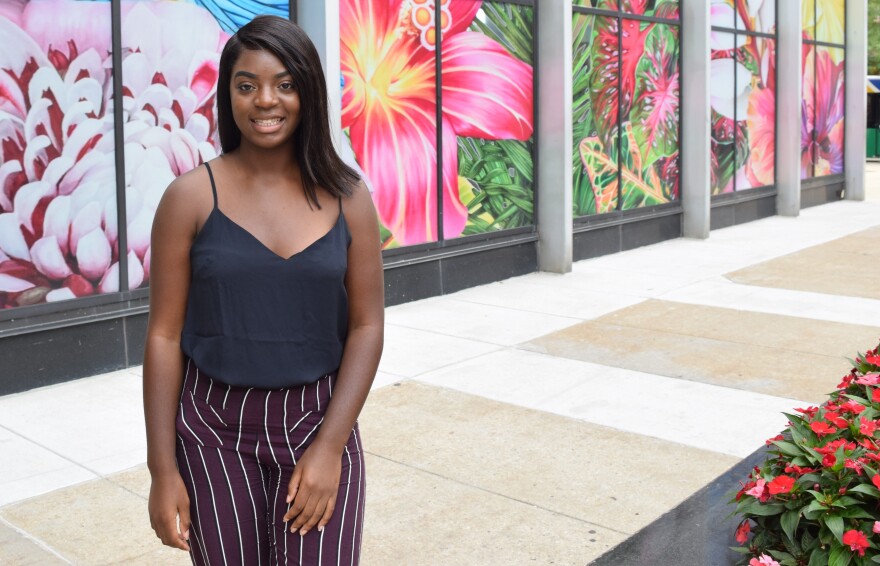Several states have taken steps to make college more affordable by creating free-tuition "promise" programs. Each one is different, but in general, they allow students to attend community college, or sometimes public universities, for free.
Last year, Wisconsin’s flagship school, UW-Madison, announced the creation of Bucky’s Promise. The program guarantees free tuition to lower-income students. But one WUWM Beats Me listener wonders why Madison, and not other Wisconsin schools?
Beats Me: What Questions Do You Have For WUWM's Beat Reporters?
No Statewide 'Promise'
In Wisconsin, there is no state-supported promise program, so each institution that wants to set up a free-tuition pathway must independently fund it.
How was Madison able to afford its promise program? Because it didn't require much additional investment. Office of Financial Aid Associate Director Greg Offerman says the school was already providing that level of financial aid to students with family incomes under $58,000.
“It hasn’t been costing us really anything additional because it’s the way we’d been awarding financial aid previously,” Offerman says.
The Bucky’s Promise Program is simply a way to advertise Madison’s need-based financial aid upfront. The idea was sparked by Madison's Student Success Through Applied Research Lab.
“It was kind of like, how do we tell people what they qualify for based on their family’s income?” Offerman says. “Kind of pull back the curtain a bit from what can be a confusing financial aid process.”
"I needed something that I could manage, because I didn't want a lot of student loans when I graduate." - Bucky's Promise Recipient Maayan Montoute
Free tuition was a major factor in student Maayan Montoute’s decision to attend Madison. Montoute is a 2019 graduate of Riverside University High School in Milwaukee. After being accepted to Madison, she learned that she qualified for Bucky’s Promise.
“I just needed something that I could manage, because I didn’t want a lot of student loans when I graduate,” Montoute says. “Because I come from a low-income family, so it was kind of all up to me.”
Bucky’s Promise is a last-dollar scholarship, which means it fills in the difference after students’ federal and state aid is applied. Montoute’s tuition is being paid through the promise program but also with a federal Pell Grant. Pell Grants are awarded to students with significant financial need, usually those whose families make $50,000 or less.
Why UW-Milwaukee Doesn't Have A Promise Program
Many elite schools like Madison have a relatively small number of low-income students. That speaks to why Madison has a free-tuition program and other UW institutions do not. At UW-Milwaukee, more than a third of students are Pell-eligible, compared to Madison's 14%. UWM has about 3,000 more Pell-eligible students than Madison.
“In terms of what we saw out of UW-Madison, which was a last-dollar approach to fill unmet need for lower-income students, that particular program is challenging for Milwaukee,” says UWM Vice Chancellor of Finance Robin Van Harpen. “Because we have such a greater body of students who are Pell-eligible and have that financial need, and a smaller revenue base overall, than Madison does.”
Tech Schools Privately Fund Promise
Promise programs have become common at Wisconsin technical colleges. Eleven out of 16 have free-tuition programs for students who meet certain income and academic standards. All of those programs are privately-funded. The first one launched at Milwaukee Area Technical College in 2015, for Pell-eligible students just out of high school.
MATC President Vicki Martin says at first, a promise program seemed unaffordable. But then she considered the last-dollar structure, which means the school is only paying the tuition not covered by Pell Grants.
“When I looked at how much our students were receiving in Pell Grants and I looked at the difference that we would have to pay, I thought, ‘We could do this,’ ” Martin says.

MATC’s cost of attendance is lower than a UW school. Most of the MATC Promise students get large enough Pell Grants to cover their full tuition, meaning the school’s free tuition program is based mostly on money the students would receive anyway.
But Martin says, the simple message of MATC Promise helps get those students in the door.
“When we tell students, 'All you have to do is apply for FAFSA [Free Application for Federal Student Aid] and you’ll be eligible,' a lot of people don’t understand that,” Martin says. “I’ll tell you what a lot of people understand is, 'College will be free, your tuition will be free.' That they do understand, and they’ll come forward and say, 'OK, what do I need to do?' ”
MATC recently expanded it program to adults who had started but not finished a college degree. Those students tend to have less federal aid available to them, so MATC has to fill in a larger tuition gap.

Although there are a number of college promise programs in Wisconsin, they’re supported on a school-by-school basis, which means they’re limited in the number of students served. Madison is a selective school. Even though MATC is an open-access institution, the promise programs have criteria like ACT scores and GPA.
At least a dozen states have taken legislative action to make community college free. But Wisconsin’s Legislature has not rallied around that idea. In past years, Republicans rejected Democratic proposals for statewide college promise programs. GOP lawmakers argued against the proposals by saying technical schools are already affordable and that students wouldn't be as invested in their education if it was free.
But Democrats haven’t given up on the idea. Rep. Katrina Shankland of Stevens Point is proposing a package of higher education bills aimed at affordability. One of them would create a taskforce to examine the possibility of a state program to provide debt-free college.
Have a question about education you'd like WUWM's Emily Files to dig into? Submit it below.
_






